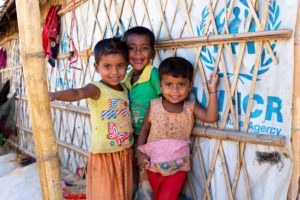I arrived today in Cox’s Bazar, just a 1-hr flight from Dhaka, where I spent a day in transition on my trip from Los Angeles. Although the main mission of my trip has not yet begun, I have already seen and heard so much.
Driving in Dhaka is an experience in and of itself. There are lanes, but no one really stays in them. Mainly cars swerve in and out, with drivers employing the horn for a split-second warning of their intentions. And, none of the seatbelts work, so it truly was a “wild ride.” Like most developing nations, Bangladesh is a study in contrasts. My hotel — brand new and extravagant — was like a glimmering fortress with armed guards, security machines, and rooms with high-tech amenities. This didn’t prevent my room from flooding at 2:30 in the morning, unfortunately.

JWW Advocacy and Grantmaking Director Ann Strimov Durbin in Bangladesh. Photo by Rares Michael Ghilezan
But, every person I have met in Dhaka thus far has been extremely gracious and kind, particularly my greeter Shahed Hasan of Journey Plus. Shahed and I spoke a lot on our two drives together.
The spirit of progress is evident. There is widespread construction, including a massive metro transit system. There are some very impressive, almost futuristic looking buildings. But, the majority of the landscape is poor, with many signs of crumbling infrastructure.
When hearing I was en route to Cox’s, several Bangladeshi people expressed displeasure at the existence of the sprawling camps and the continued “occupation” of the Rohingya — with no practical end in sight. “With a country so poor still, why must we give so much to these Rohingya? They are Myanmar’s problems,” a passenger beside me said. Another man told me, “in Teknaf they have taken down all the trees,” essentially encroaching on the host community. It seems that the lack of a solution is what frustrates people most.
This doesn’t mean people’s hearts don’t bleed for the Rohingya. Horror for what they have suffered at the hands of the Tatmadaw is comingled with a desire to place them elsewhere. When I point out that they will surely face genocide if they are forced to return to Myanmar — in contravention of international law — everyone I spoke to agrees. One who asked not to be named told me, “I spoke to one woman when I was with a client in the camps. She said her brother and father were killed in front of her and that she was brutally raped four times. This is too horrible. My heart cannot take it. I won’t go back.”
“This is too horrible. My heart cannot take it.”
The camps have created an aid economy for Cox’s Bazar. With many local organizations charged with implementing the project funded through and coordinated by U.N. agencies and larger international organizations, the camp economy certainly employs a great number of locals.
“Journalists” swarm the camps, eager to write the most gruesome tale of heartbreak or snap the most heart-wrenching of photos. My professional colleagues in Washington, D.C. warned me that people often bring foreigners to the same few refugees for their tales of woe again and again — essentially re-traumatizing them with each re-telling and bringing forth inconsistencies or altered details in their testimonies, thereby threatening the legitimacy of evidence collection for the purpose of prosecuting atrocity crimes.
I realize that I must not take anything at face value and be very sensitive to the needs and memories of the survivors with whom I will interact. I trust that the partners who will guide me through this experience do not ascribe to the side-show approach to bearing witness. While I expect some of that, my eyes are open and I am committed to doing my best to do right by all those I am privileged enough to meet.


